Related Research Articles
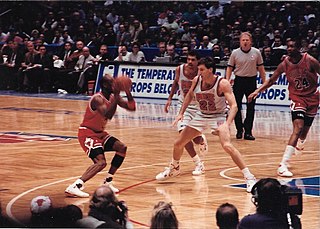
Basketball is a team sport in which two teams, most commonly of five players each, opposing one another on a rectangular court, compete with the primary objective of shooting a basketball through the defender's hoop, while preventing the opposing team from shooting through their own hoop. A field goal is worth two points, unless made from behind the three-point line, when it is worth three. After a foul, timed play stops and the player fouled or designated to shoot a technical foul is given one, two or three one-point free throws. The team with the most points at the end of the game wins, but if regulation play expires with the score tied, an additional period of play (overtime) is mandated.

Larry Joe Bird is an American former professional basketball player, coach, and executive in the National Basketball Association (NBA). Nicknamed "the Hick from French Lick" and "Larry Legend", Bird is widely regarded as one of the greatest basketball players of all time. He is the only person in NBA history to be named Rookie of the Year, Most Valuable Player, Finals MVP, All-Star MVP, Coach of the Year, and Executive of the Year.

The Detroit Pistons are an American professional basketball team based in Detroit. The Pistons compete in the National Basketball Association (NBA) as a member of the Central Division of the Eastern Conference. The team plays its home games at Little Caesars Arena, located in Midtown Detroit. The team was founded as the Fort Wayne Zollner Pistons, a semi-professional company basketball team based in Fort Wayne, Indiana, in 1937. The club would turn professional in 1941 as a member of the National Basketball League (NBL), where they won two NBL championships: in 1944 and 1945. The Pistons later joined the Basketball Association of America (BAA) in 1948. The NBL and BAA merged to become the NBA in 1949, and the Pistons became part of the merged league. In 1957, the franchise moved to Detroit. The Pistons have won three NBA championships: in 1989, 1990 and 2004.

The Naismith Memorial Basketball Hall of Fame is an American history museum and hall of fame, located at 1000 Hall of Fame Avenue in Springfield, Massachusetts. It serves as basketball's most complete library, in addition to promoting and preserving the history of basketball. Dedicated to Canadian-American physician James Naismith, who invented the sport in Springfield, the Hall of Fame inducted its first class in 1959, before opening its first facility on February 17, 1968.

James Naismith was a Canadian-American physical educator, physician, Christian chaplain, and sports coach, best known as the inventor of the game of basketball. After moving to the United States, he wrote the original basketball rule book and founded the University of Kansas basketball program in 1898. Naismith lived to see basketball adopted as an Olympic demonstration sport in 1904 and as an official event at the 1936 Summer Olympics in Berlin, as well as the birth of the National Invitation Tournament (1938) and the NCAA Tournament (1939).

YMCA, sometimes regionally called the Y, is a worldwide youth organization based in Geneva, Switzerland, with more than 64 million beneficiaries in 120 countries. It was founded in London on 6 June 1844 by George Williams as the Young Men's Christian Association. The organization aims to put Christian values into practice by developing a healthy body, mind, and spirit.
The 50 Greatest Players in NBA History, also referred to as NBA's 50th Anniversary All-Time Team, were chosen in 1996 to honor the 50th anniversary of the founding of the National Basketball Association (NBA). It was the third anniversary team in the league. Fifty players were selected through a vote by a panel of media members, former players and coaches, and current and former general managers. In addition, the top ten head coaches and top ten single-season teams in NBA history were selected by media members as part of the celebration. The 50 players had to have played at least a portion of their careers in the NBA and were selected irrespective of position played.

Springfield College is a private university in Springfield, Massachusetts. The institution's philosophy, termed "humanics," underscores the importance of educating individuals in mind, body, and spirit to cultivate leadership abilities geared towards serving others. It is also notable for its historical significance as the birthplace of basketball, which was invented on campus in 1891 by Canadian-American instructor James Naismith.
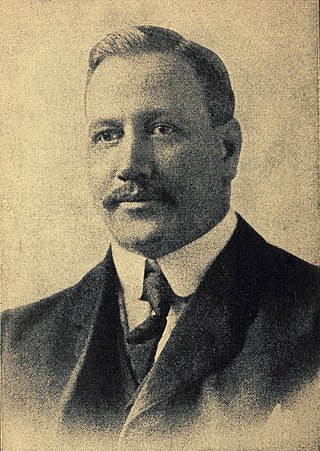
William George Morgan was the inventor of volleyball, originally called "Mintonette", a name derived from the game of badminton which he later agreed to change to better reflect the nature of the sport. He was born in Lockport, New York, U.S.
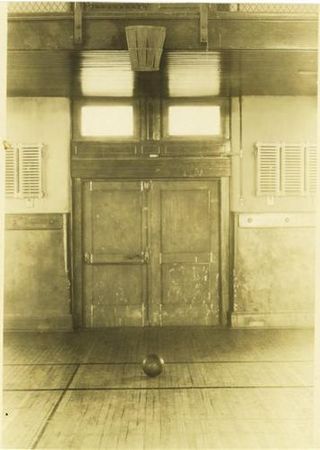
The First Team were the first players known to have played the sport of basketball, having been taught the game in 1891 by James Naismith, who is recognized as the inventor of the sport. The team comprised 18 players who were studying in Springfield, Massachusetts, to become executive secretaries of the YMCA and who, as part of their coursework, studied physical education with Naismith, who is said to have invented the game to teach teamwork skills to his charges. The team was inducted as a group into the Naismith Memorial Basketball Hall of Fame as part of that organization's inaugural 1959 induction class for their efforts in popularizing the sport and as the game's first practitioners.
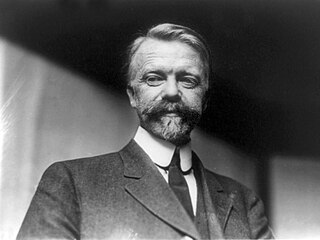
Luther Halsey Gulick Jr. (1865–1918) was an American physical education instructor, international basketball official, and founder with his wife of the Camp Fire Girls, an international youth organization now known as Camp Fire.
The following are the basketball events of the year 1892 throughout the world.

Ann "Muffet" McGraw is an American former college basketball coach, who served as the head women's basketball coach at Notre Dame from 1987 to 2020, compiling a 848–252 (.771) record over 33 seasons.
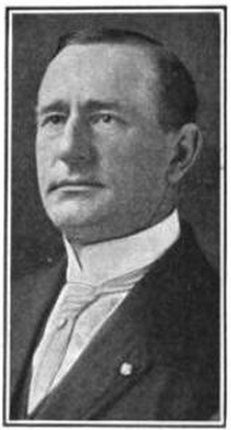
Charles Otis Bemies was an American football, basketball, and baseball coach and Presbyterian minister. He became acquainted with James Naismith while studying at Springfield College in the late 1880s. While serving as the athletic director at Geneva College, he organized the first college basketball team in 1892. He graduated from the Western Theological Seminary and was ordained as a Presbyterian minister in 1897. From 1899 to 1901, he served as the first basketball and second football coach at Michigan Agricultural College. After retiring from coaching, Bemies served for many years as a Presbyterian minister and evangelist in rural Pennsylvania. He was also active with YMCA, serving with that organization in Russia in 1918 and in South Dakota in the early 1920s. Bemies lived in Minneapolis, Minnesota, in his later years and died there in 1948. He was posthumously inducted into the Beaver County Hall of Fame in 1992.

Basketball began with its invention in 1891 in Springfield, Massachusetts, by Canadian physical education instructor James Naismith as a less injury-prone sport than football. Naismith was a 31-year-old graduate student when he created the indoor sport to keep athletes indoors during the winters. The game became established fairly quickly and grew very popular as the 20th century progressed, first in America and then in other parts of the world. After basketball became established in American colleges, the professional game followed. The American National Basketball Association (NBA), established in 1946, grew to a multibillion-dollar enterprise by the end of the century, and basketball became an integral part of American culture.

The International Basketball Federation is an association of national organizations which governs the sport of basketball worldwide. FIBA defines the rules of basketball, specifies the equipment and facilities required, organizes international competitions, regulates the transfer of athletes across countries, and controls the appointment of international referees. A total of 212 national federations are members, organized since 1989 into five zones: Africa, Americas, Asia, Europe, and Oceania.
The Amateur Athletic Union Men's Basketball All-Americans were players who competed in the Amateur Athletic Union (AAU) between 1920–21 and 1967–68 and were chosen as the best players in the league during their respective seasons. Founded in 1888, the Amateur Athletic Union is one of the largest non-profit, volunteer, sports organizations in the United States. It is dedicated exclusively to the promotion and development of amateur sports and physical fitness programs.
References
- ↑ McCuaig, Donald. "Basketball: A YMCA Invention". YMCA. Archived from the original on 2016-03-14. Retrieved June 9, 2014.
- ↑ Griffiths, Sian (September 20, 2010). "The Canadian who invented basketball". BBC. Retrieved June 9, 2014.
- ↑ "James Naismith". Naismith Museusm. Archived from the original on September 14, 2013. Retrieved June 9, 2014.